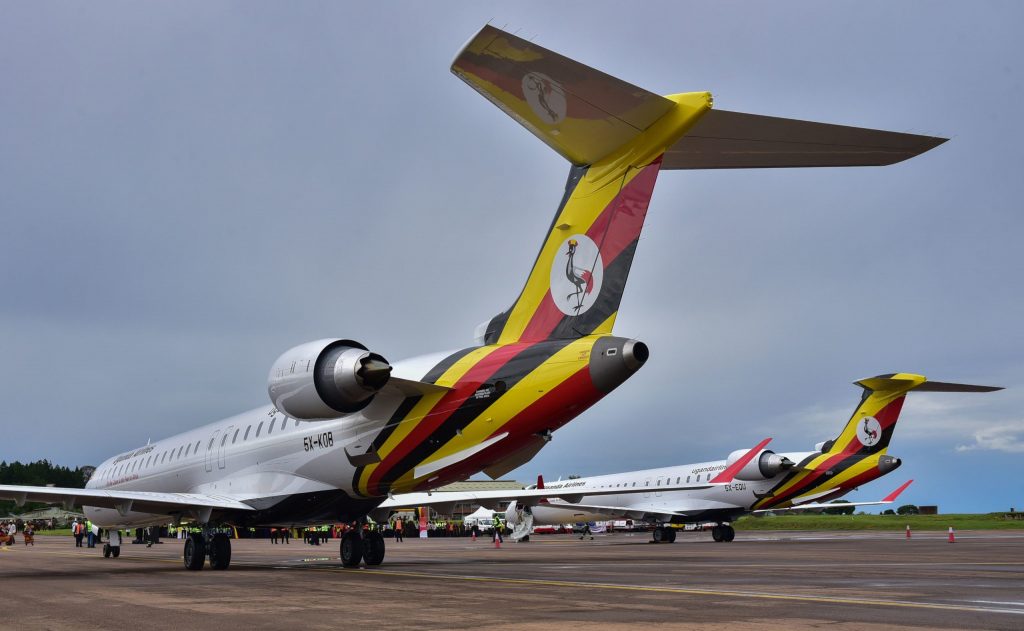Uganda’s aviation industry still slow paced – Officials
3 min read
Uganda’s aviation industry is slowly picking up as countries open airspaces, according to airline operators and travel agents. They, however, say that the situation in Uganda is a reflection on the aviation industry globally.
Entebbe Airport used to handle more than 120 flights a day, generating revenue of about 20 billion Shillings a month, before the closure of borders in March. But for seven months, traffic at the airport was only limited to emergency and cargo flights as Uganda, as was the case for several other countries, across the globe, sought to tame the spread of coronavirus disease.
During the seven months’ lull, the revenue drastically reduced to one billion Shillings a month. But commercial passenger flights are now back, in a phased approach with 16 airlines now operating international flights to over ten destinations across the world. They include Uganda Airlines, Tarco Airlines, Rwandair, Kenya Airways, Qatar Airways and Emirates, among others.
In the first phase running from October to December 2020, all airlines, apart from Uganda Airlines are supposed to operate only one flight a day to avoid congestion at Entebbe Airport. Under this restricted arrangement, a total of 13,002 passengers were handled at Entebbe Airport in the first 12 days of its reopening on October 1, according to records by the Civil Aviation Authority.
Vianney Luggya, the spokesperson Uganda Civil Aviation Authority-UCAA says that the airport has mostly handled incoming passengers.
Before the closure, the airport handled a total of 1.9 million passengers in 2019, an average of 160,000 passengers a month. But now agents and airline officials are doubtful that the numbers could even hit 50,000 by end of this month.
Joel Ssentongo, the Passenger Service Manager at Tarco Airlines says that business is still slow because the airport is mainly handling essential travellers such as nationals and legal residents, as opposed to the business community. Many of those travelling out of the country is sick, going for work, studies or returning home, and usually, the 120-seater airline has only 50 passengers on board.
“Many people used to travel for business in China but they are now going to Dubai and Turkey while others who would be attending conferences, exhibitions and visiting family and friends are no longer travelling,” he added. Ssentongo says Tarco airlines is operating only one flight a week to Juba and Khartoum because Uganda’s aviation industry is picking up slowly. Before the partial shutdown, the airline used to operate three flights a week.
Meanwhile, Roger Wamara, the Uganda Airline’s Commercial Director, says that all four routes are steadily improving, with Juba and Mogadishu being the most sought after. The airline also flies to Nairobi and Dar-es-salaam, routes that are steadily picking up, compared to the first day of reopening where less than 40 passengers boarded the flight to Nairobi.
Travel agents led by Irene Nalwoga, the Managing Director of Renewills Tours and Travel Ltd and Women Tour Uganda attribute the slow resumption of travel to fear of contracting COVID-19 and also the ever-changing travel restrictions across the world. Meanwhile, Nalwoga says that some people are hesitant to travel now because countries might lockdown again, which could leave then stranded overseas.
A parent who preferred anonymity says her son travelled to Rwanda for studies. But, he will be tested for COVID-19 upon arrival and be quarantined for 24 hours and only be released after testing positive for COVID-19. She says using a bus to Kigali would have been a gruesome journey.
Over the weekend, some of the outgoing passengers told URN that they are travelling for work in the Middle East, Turkey and within Africa, while three were students flying to Canada, USA and Rwanda.
In its latest statement, the International Civil Aviation Organization (ICAO), projects that there will be an overall reduction in both international and domestic air passengers in a range projected between 59 and 62 per cent this year. As a result, airports globally will record an estimated revenue loss of over USD 104.5 billion (389 trillion Shillings)
The will also be a decline in international tourism receipts of about USD 1.1 trillion in 2020, compared to the USD 1.5 trillion generated in 2019, with 100 per cent of worldwide destinations having travel restrictions.
URN





